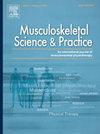干针刺头直肌后大肌时降低风险的指南。
IF 2.2
3区 医学
Q1 REHABILITATION
引用次数: 0
摘要
背景:头痛疾病非常普遍,常常导致残疾。头直肌后大肌(RCPMaj)可能通过痛觉收敛和肌硬膜桥接参与头痛症状。目的:建立针长和针角的指导方针,以减轻干针过程中的风险。设计:尸体调查。方法:25具尸体,平均年龄80.1±13.2岁,俯卧位放置。从皮肤到C2棘突的深度测量在中线切口后进行。继续解剖暴露RCPMaj,测量三个角度,包括:1)从额平面的后角,2)从中线的侧角,3)从枕外隆突到RCPMaj外侧的距离。结果:采用C2棘突上盖组织厚度平均值(37±7.3 mm)、RCPMaj后部距额面角平均值(65.2°±10°)、RCPMaj外侧距中线角平均值(34.7°±12.9°)、枕骨外突距最外侧RCPMaj距离平均值(30.6 mm±9.3 mm)计算出针倾角≤45°及针长本文章由计算机程序翻译,如有差异,请以英文原文为准。
Guidelines to minimize risk when dry needling the rectus capitus posterior major muscle
Background
Headache disorders are prevalent often leading to disability. The rectus capitus posterior major muscle (RCPMaj) may contribute to headache symptoms via nociceptive convergence and myodural bridging.
Objectives
To establish guidelines for needle length and needle angle to mitigate risks during dry needling RCPMaj.
Design
Cadaveric investigation.
Methods
Twenty-five cadavers (mean age: 80.1 ± 13.2 years) were placed in prone. Depth measurements from the skin to the C2 spinous process were taken following midline incision. Dissection continued exposing the RCPMaj for three measures including: 1) posterior angle from the frontal plane, 2) lateral angle from midline, and 3) distance from the external occipital protuberance to the lateral most RCPMaj.
Results
Mean values for tissue thickness overlying C2 spinous process (37 ± 7.3 mm), RCPMaj posterior angle from the frontal plane (65.2° ±10°), RCPMaj lateral angle from midline (34.7° ±12.9°), and distance from the external occipital protuberance to the lateral most RCPMaj (30.6 mm ± 9.3 mm) were used to calculate a needle inclination of ≤45° and a needle length <40 mm to reach the occipital portion of RCPMaj with an a priori insertion point of midway between the C2 spinous process and the C1 transverse process.
Conclusion
Inserting a dry needle <40 mm in length midway between the C2 spinous process and the C1 transverse process with a cranial angle of ≤45° relative to the frontal plane would increase the likelihood of reaching the RCPMaj and mitigate penetrating deeper structures.
求助全文
通过发布文献求助,成功后即可免费获取论文全文。
去求助
来源期刊

Musculoskeletal Science and Practice
Health Professions-Physical Therapy, Sports Therapy and Rehabilitation
CiteScore
4.10
自引率
8.70%
发文量
152
审稿时长
48 days
期刊介绍:
Musculoskeletal Science & Practice, international journal of musculoskeletal physiotherapy, is a peer-reviewed international journal (previously Manual Therapy), publishing high quality original research, review and Masterclass articles that contribute to improving the clinical understanding of appropriate care processes for musculoskeletal disorders. The journal publishes articles that influence or add to the body of evidence on diagnostic and therapeutic processes, patient centered care, guidelines for musculoskeletal therapeutics and theoretical models that support developments in assessment, diagnosis, clinical reasoning and interventions.
 求助内容:
求助内容: 应助结果提醒方式:
应助结果提醒方式:


